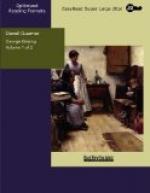That he would be returned, he had no doubt. The campaign proceeded gloriously. Whilst Mr. Gladstone flowed on for ever in Midlothian rhetoric, Denzil lost no opportunity of following his leader, and was often astonished at the ease with which he harangued as long as Polterham patience would endure him. To get up and make a two hours’ speech no longer cost him the least effort; he played with the stock subjects of eloquence, sported among original jokes and catch-words, burned through perorations with the joy of an improvisatore in happiest mood. The Examiner could not report him for lack of space; the Mercury complained of a headache caused by this “blatant youthfulness striving to emulate garrulous senility”—a phrase which moved Denzil to outrageous laughter. And on the whole he kept well within such limits of opinion as Polterham approved. Now and then Mr. Chown felt moved by the spirit to interrogate him as to the “scope and bearing and significance” of an over-bold expression, but the Radical section was too delighted with a prospect of victory to indulge in “heckling,” and the milder Progressives considered their candidate as a man of whom Polterham might be proud, a man pretty sure to “make his mark” at Westminster.
In the hostile ranks there was a good deal of loud talk and frequent cheering, but the speeches were in general made by lieutenants, and the shouts seemed intended to make up for the defective eloquence of their chief. Mr. Welwyn-Baker was too old and too stout and too shaky for the toil of personal electioneering. He gave a few dinners at his big house three miles away, and he addressed (laconically) one or two select meetings; for the rest, his name and fame had to suffice. There was no convincing him that his seat could possibly be in danger. He smiled urbanely over the reports of Quarrier’s speeches, called his adversary “a sharp lad,” and continued through all the excitement of the borough to conduct himself with this amiable fatuity.
“I vow and protest,” said Mr. Mumbray, in a confidential ear, “that if it weren’t for the look of the thing, I would withhold my vote altogether! W.-B. is m his dotage. And to think that we might have put new life into the party! Bah!”
Conservative canvassers did not fall to make use of thee fact that Mr. Welwyn-Baker had always been regardful of the poor. His alms-houses were so pleasantly situated and so tastefully designed that many Polterham people wished they were for lease on ordinary terms. The Infirmary was indebted to his annual beneficence, and the Union had to thank him—especially through this past winter—for a lightening of its burden. Aware of these things, Lilian never felt able to speak harshly against the old Tory. In theory she acknowledged that the relief of a few families could not weigh against principles which enslaved a whole population (thus Quarrier put it), but her heart pleaded for the man who allayed suffering




